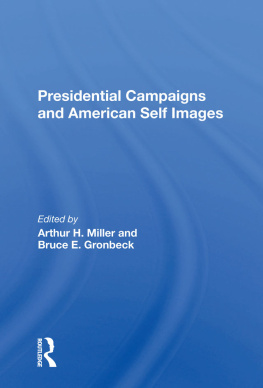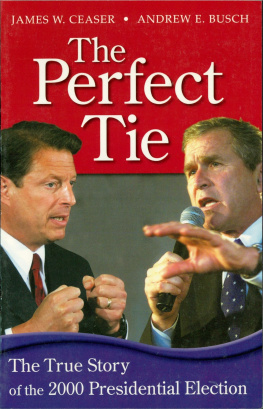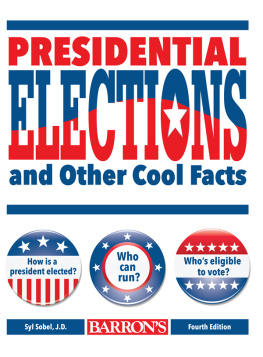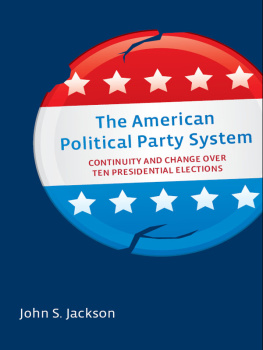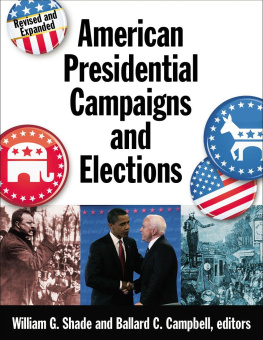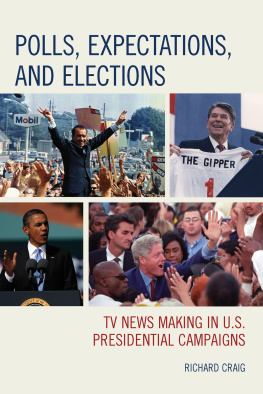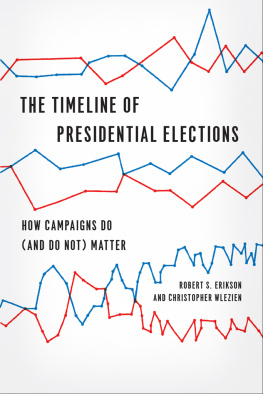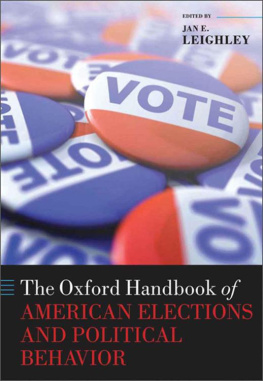First published 1994 by Westview Press, Inc.
Published 2019 by Routledge
52 Vanderbilt Avenue, New York, NY 10017
2 Park Square, Milton Park, Abingdon, Oxon OX14 4RN
Routledge is an imprint of the Taylor & Francis Group, an informa business
Copyright 1994 Taylor & Francis
All rights reserved. No part of this book may be reprinted or reproduced or utilised in any form or by any electronic, mechanical, or other means, now known or hereafter invented, including photocopying and recording, or in any information storage or retrieval system, without permission in writing from the publishers.
Notice:
Product or corporate names may be trademarks or registered trademarks, and are used only for identification and explanation without intent to infringe.
Library of Congress Cataloging-in-Publication Data
Presidential campaigns and American self images / edited by Arthur H. Miller and Bruce E. Gronbeck.
p. cm.
Includes bibliographical references and index.
ISBN 0-8133-1885-8. 0-8133-8899-6 (PB)
1. PresidentsUnited StatesElection. 2. Political cultureUnited States. 3. ElectioneeringUnited States. 4. Communication in politicsUnited States. I. Miller, Arthur H., 1942II. Gronbeck, Bruce E.
JK528.P74 1994
324.63'0973dc20
94-27733
CIP
ISBN 13: 978-0-367-28419-0 (hbk)
University House at the University of Iowa's Oakdale Research Campus was founded in 1977 by then-President Willard R. Boyd and Vice President for Educational Development and Research D. C. Spriestersbach. Situated in Oakdale Hall, originally the state's primary tuberculosis sanitarium, University House was thought of as a retreat for University faculty, a place where they could get away from their daily chores while on leave. With no office phones, a library service, and other academic support, University House was a site for interesting, cross-disciplinary conversation, coffee, contemplation, and personal reinvigoration.
External funding by The Andrew Mellon Foundation and the Exxon Foundation brought in faculty from regional liberal arts colleges, often teaming with University of Iowa faculty on projects expected to have both instructional and scholarly payoffs. Nearby Kirkwood Community College used it as a site for faculty development and seminars, often directed by University of Iowa scholars. A major grant from National Endowment for the Humanities in 1984 made University House the home of The Renaissance Connection Consortium, which presented nine regional conferences and ten books and art exhibits in cities and towns across the state of Iowa. And, too, more and more faculty took advantage of Director Jay Semel's experience in obtaining federal and foundation grants and in administration, and so used University House as the location for executing the projects thus funded.
Next, University House began running its own internally funded programa summer competitive, collaborative research grant program to bring University faculty out on cross-disciplinary research projects. The program was of special interest to an Iowa alumnus and loyal supporter of both sporting and academic activities, Dr. C. Esco Obermann, who was a member of University House's Advisory Committee. He argued that such research should be a central mission for University House, bringing together a full range of teacher-scholars from varied backgrounds and institutions, engaging in free-flowing dialogue on matters of theoretical and practical importance, and then circulating the results of deliberations widely. He saw its purpose as:
to: (1) facilitate the quality of research at the University of Iowa by giving support and expression to the reality that knowledge and its applications are basically multidisciplinary; (2) encourage the discovery of new knowledge through research performed within the context of that axiom; (3) attract to the University of Iowa scholars who have the capabilities necessary to conduct that type of research; (4) encourage contribution of funds to University House, matching and supplementing funds in support of scholars receiving Obermann Fellowships; (5) enhance the status and reputation of the University of Iowa as a leader in multidisciplinary research and publication (Obermann 1990).
Dr. Obermann not only advocated such an expansion of University House programming, but also backed up his advice with funds for an annual summer seminar for scholars from inside and outside the University of Iowa.
In the summer of 1991, President Hunter Rawlings III along with Vice Presidents Peter Nathan and James Morrison obtained approval from the Board of Regents to name University House the University of Iowa Center for Advanced Studies. The Center was inaugurated with its first summer seminar, "Presidential Campaigning and American Self Images," codirected by a political scientist, Professor Arthur H. Miller, and a rhetorical critic, Professor Bruce E. Gronbeck. Thanks to Dr. and Mrs. Obermann's grant and the University's matching monies, eleven scholars gathered at the Center for four weeks of writing, presentation, critique, and revision.
Selected competitively from off-campus were Obermann Fellows Monica Bauer, Western New England College; Ronald Lee, Indiana University; Milton Lodge, SUNY at Stony Brook; Joanne Morreale, Northeastern University; David Woodard, Clemson University; and Harold Zullow, Rutgers University. In addition to Professors Miller and Gronbeck, Iowa-based Obermann Fellows included G. R. Boynton, Cary Covington, and Dianne Rucinski. Fellows were elected for their scholarly strengths and range of specialties. The codirectors wanted as many topics covered as possible, both to open up the full range of questions inhering in the topic and to provide essays for this volume.
The strengths and range of the Fellows are illustrated in the following essays. Still, some important topics were not especially well represented in the seminar. So, two additional papers were recruited to broaden this volume: Daniel Merkle and Peter Miller were asked to write about the role of public opinion polls in presidential elections, and David Birdsell was asked to extend some of the thinking found in his book on presidential debates in a new essay.
The Obermann Summer Seminars continue annually at Iowa's Center for Advanced Studies, thanks to the generosity and vision of C. Esco Obermann, support from Vice President for Research David Skorton, the developmental talents of Center Director Jay Semel, the efficiency of the Center's staff, Lorna Olson and Lynette Wright, the work of the directors, and the willingness of solid scholars to put themselves in a no-holds-barred, month-long critique and revision session. This and future volumes will be testaments to the creative force and rigor of the seminars.

